
The Reading Experience Database is largely supported by the contributions of a large number of volunteers who have generously donated their time, energy, and expertise to the project. The RED Team is enormously grateful for these contributions.
On this page you can find information about becoming a volunteer for the Reading Experience Database, suggestions for future research, a summary of the current research interests of our volunteers. We have also appended a list of names below of all those who have kindly offered assistance to this project since 2006.
The RED Project has acquired a new intensive research area: reading during the First World War. We are especially interested in locating previously unknown and unpublished sources, such as letters and manuscript diaries, that bear traces of reading during the 1914–18 period. If anyone has this kind of material in their possession, or knows of particular sources that we might like to use, we'd love to hear from you.
Anyone interested in working on a particular individual who lived in or visited Britain during the period 1450–1945 and who left letters, diaries, annotated books, autobiographies, etc., which contain references to their reading should get in touch with us. RED is looking for volunteers to work their way systematically through such materials in order to record evidence of reading.
If you would like to get involved with the project in any way, we are always delighted to hear from you! Please contact the project team.
People contribute to our project in many different ways, but most commonly, we ask our volunteers to pick a reader—this can be a famous figure, or a relatively obscure one. It could also be a family member, if you own or know about material relating to their reading. Examples of material contributed from private collections can be found below. If you are already interested in a particular person, you can suggest that person to us, or you can pick one of the readers from the list below.
We then ask you to work through the diaries, letters, autobiographies, or memoirs of that person, noting every instance of reading either on to our online contribution forms, or on to a hard copy of the form, which you can then send back to us by email or by post.
Obviously, there is more material for some readers than for others, so the amount of material you will have to look at varies enormously—just let us know how much time you have available to spend on the project, and we can match you up with the most suitable historical figure.
We will supply you with a list of books to work from, and guidance about filling in the forms, and we are always happy to answer questions from you. We will also always listen to suggestions from you about how we might improve the database, or other ways in which you might like to contribute to the project.
You will be contributing to an internationally-recognised scholarly resource. Volunteers are the lifeblood of the RED project, and we value their contributions enormously. We also believe that being a RED volunteer is interesting and useful for the people who do it. For those with an enquiring turn of mind, the research brings its own rewards and benefits.
Please send an e-mail to red-project@open.ac.uk, and one of the RED team members will get you started!
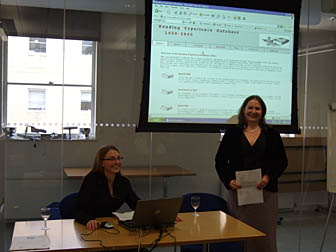 |
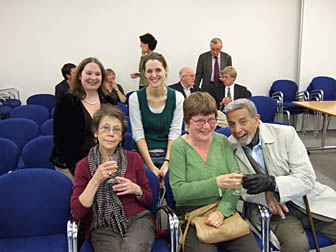 |
Rosalind Crone and Katie Halsey demonstrate the online database at the RED launch, June 2007 (© Shaf Towheed and Katie Halsey) |
Katie Halsey with RED volunteers at the launch (© Shaf Towheed and Katie Halsey) |
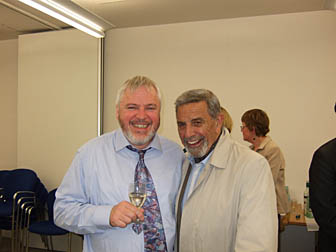 |
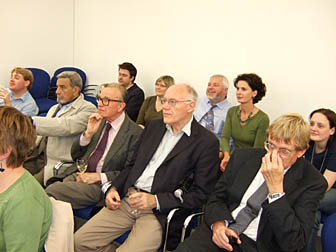 |
Project Director Bob Owens raises a glass with a volunteer at the RED launch (© Shaf Towheed and Katie Halsey) |
RED volunteers and other guests watch the demonstration of the online database at the RED launch (© Shaf Towheed and Katie Halsey) |
The following readers are currently being researched by volunteers:
Arnold Bennett
Elizabeth Bowen
Vera Brittain
Frances Burney
Thomas Carlyle
Jane Carlyle
Joseph Conrad
Mary Hayden
Walter Scott
Robert Louis Stevenson
A number of volunteers have also contributed material to RED from their own private collections. These include the journals or memoirs of a family member containing descriptions of their reading in the past, as well as old books which contain evidence of reading in their pages.
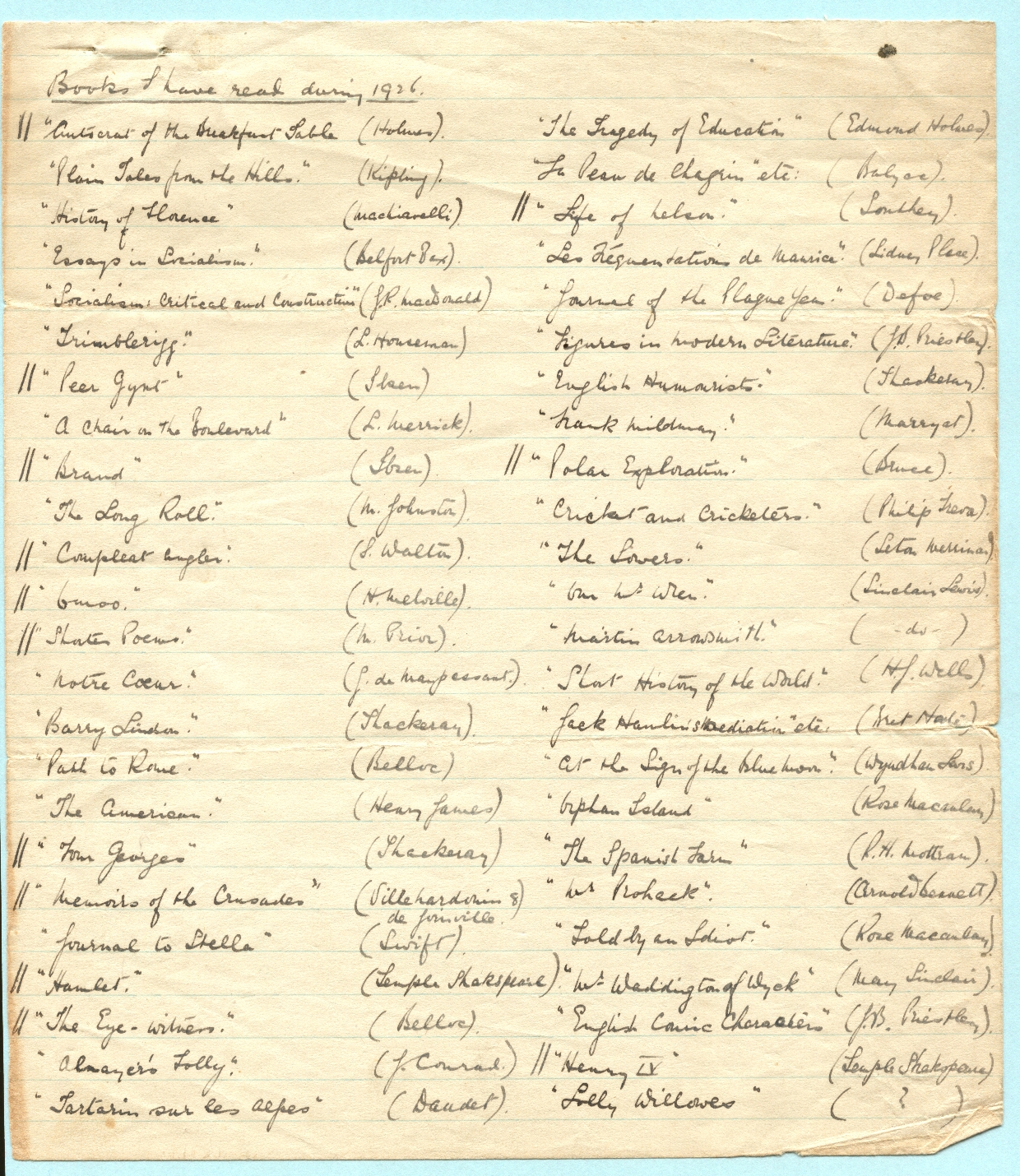 |
'Books I have read during 1926': a portion of a list from the diary of Gerald Moore (© Shirley Gould-Smith and with kind permission of Shirley Gould-Smith) |
Early 18th-century marginal notes made in a 1615 Bible (© Rosalind Crone with kind permission of James Griffin) |
Marginal notes in a late 15th century book of sermons (© Rosalind Crone with kind permission of James Griffin) |
If you would like to become a RED volunteer, we would be delighted for you to suggest a reader who interests you. Alternatively, we are keen to accumulate evidence of the reading of (among others):
Anna Barbauld
Annie Besant
Winston Churchill
John Constable
Charles Darwin
Benjamin Disraeli
Susan Ferrier
William Godwin
Charles Kingsley
Charles Lamb
T. E. Lawrence
C. S. Lewis
Henry Mackenzie
William Morris
Cardinal Newman
Siegfried Sassoon
Robert Louis Stevenson
William Thackeray
J. R. R. Tolkien
Beatrice Webb
William Wilberforce
William Butler Yeats
As many of you probably know, Robert Louis Stevenson was an avid reader, and as such, we are very eager to record his reading experiences in RED. However, we are also aware that the interest in Stevenson and literature goes beyond the data we can store in RED: under the current definition of a 'reading experience', we have to exclude records of Stevenson's borrowing of books and the many allusions he makes to different texts in his letters. Therefore, we have embarked on a joint venture with Richard Dury at the Robert Louis Stevenson Society, who has recently begun to collect this information in a database intended for public use. We are now looking for volunteers with an interest in Robert Louis Stevenson to read through one or several volumes of Stevenson's correspondence in order to extract information about his reading experiences (which will be stored in RED) and/ or allusions to various texts (which will be stored in the Stevenson database). In addition to RED, entries from both databases will be made available to the public via the Robert Louis Stevenson Society website. If you are interested in contributing to this project, please do get in touch with us. We are very excited about the potential outcomes of this research!
In summer 2007, we were delighted to welcome Laura Lambert to the RED Team as a work experience student. While with us, Laura worked on several important nineteenth-century autobiographies and developed a particular interest in childhood reading. At the end of her time with us, Laura wrote a report on her work which was published in the Autumn 2007 issue of REDLetter.
Follow this link to read Laura's report for the Reading Experience Database.
At RED, we owe an enormous debt to our volunteers, who painstakingly comb through volumes of material for evidence of reading experiences, and to all those who contribute to the database and the project as a whole. People contribute in many different ways: by using the online forms to input data; by suggesting references, texts, and readers for us to follow up; by suggesting improvements to the website; by helping to spread the word about RED; by putting our flyer in conference packs, and by contributing to REDletter.
We would like to express our warm gratitude to the following people for their various contributions since July 2006:
| Hilary Adams | Alison Beer | Daniel Allington | Sophie Bankes |
| Alison Beer | Alice Berry | Fiona Black | Ian Blyth |
| Sophia Braybrooke | Gill Buckle | Patrick Buckridge | Charlotte Cairns |
| Helen Chambers | Anna Charlton | Berry Chevasco | Michèle Cohen |
| Sandra Cumming | Alyson Cunningham | Richard Daniels | Sophie DeFrance |
| Mary Dodkins | Gillian Dow | Lindsey Eckert | Elizabeth Eger |
| Whitney Feininger | Sheila Ferguson | David Finkelstein | Shirley Foster |
| Danielle Fuller | Philip Goldstein | Joanna Goldsworthy | Caroline Gonda |
| Shirley Gould-Smith | James Griffin | Claire Harris | Jenny Hartley |
| Cath Hawkes | Anne Henry | Andrew Hobbs | David Hounslow |
| Gillian Hughes | Susie Jay | Sarah Johnson | Tony Jones |
| Ludmilla Jordanova | James Kennedy | Donald Kerr | Elspeth Knights |
| Laura Lambert | Anouk Lang | Eric Langley | Robin Lewis |
| Mark Llewellyn | Sue MacPherson | Jenny Maidment | Jenny McAuley |
| Femke Molekamp | John Morton | Monica Mukherji | Anita O'Connell |
| Bob Pearce | Andrew Pettegree | Bill Pidduck | Katy Price |
| Guy Pringle | David H. Radcliffe | Catherine Reid | Pamela Robinson |
| Nick Roe | Sharon Ruston | Angela Scott | Brad Scott |
| Rosemary Scott | Dorothy Sheridan | Malcolm Shifrin | Michael Slater |
| John Spiers | William St Clair | Felicity Stimpson | Louisa Symington |
| Andrew Taylor | Melanie Taylor | Margaret Thomas | Faye Thompson |
| Mark Towsey | Patrick Vaughan | Angus Vine | Marcus Waithe |
| Maggie Washington | Rowan Watson | Alison Weardon | Rhoda Willson |
| Karen Wintle | Joanne Withers | Juliet Wragge-Morley |